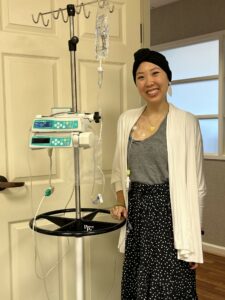Most women are unable to receive annual mammograms and/or breast ultrasounds until the age of 40. This is despite the fact that, according to a study published by JAMA Network Open in August 2023, more young women under 50 are being diagnosed with cancer. In fact, from 2010 to 2019, diagnosed patients between the ages of 30 and 39 increased by 19.4%.
Because I had a family history of breast cancer, with my mother being diagnosed in her late 30s and her mother in her 70s, I was able to receive access to annual mammograms starting in my early 30s. My annual mammogram in 2022, which was only my second ever, led to an initial diagnosis of Stage 0 Ductal Carcinoma in Situ (DCIS) breast cancer at the age of 33.
After being diagnosed, I underwent a lumpectomy to remove the cancerous calcifications. The pathology from my surgery showed that I also had Invasive Ductal Carcinoma (IDC) cells, advancing me to Stage 1, ER+ (estrogen receptor positive), HER2+ (human epidermal growth factor receptor 2 positive) breast cancer. HER2 is a protein that promotes the growth of cancer cells, making cancer a lot more aggressive.
Though this new information extended my treatment plan and increased the seriousness of my diagnosis, I feel incredibly grateful to have been diagnosed at such an early stage. My husband and I had been trying for a baby just before I was diagnosed. Looking back, if I had successfully gotten pregnant, my body would have produced an influx of estrogen hormones, thus activating my estrogen-responsive cancer cells, which, combined with the HER2 proteins, would have put cancer on a fast track to metastasis.
Since being diagnosed in late October of 2022, I’ve gone through fertility treatment, multiple surgeries, 12 weeks of chemotherapy, 20 rounds of radiation, and continued neoadjuvant therapy in the form of a painful injection in my thigh every three weeks. I am also on a long-term medication called Tamoxifen which blocks estrogen in my body.
Cancer has been full of changes, many of them extreme:
- I went from rarely visiting the hospital and taking zero daily medications to going to the cancer center multiple times a week and having a full medicine cabinet.
- I went from having thick, long hair and eyelashes to being completely bald to now having the precursor to a pixie cut.
- I went from being a total wimp about medical procedures to going through so many I lost count.
- I went from having an active, busy schedule to spending most of my time at home resting.
- I went from thinking my biggest worries were a bad day at work to conquering the intense side effects from treatments/medications and the fear of recurrence.
Going through cancer is hard at any age, but as someone in your early 30s it can be especially isolating. While your friends and colleagues are getting married, having kids, traveling the world, going to music festivals, and moving up in their careers, life comes to a standstill. As a result of chemotherapy and hormone blockers, many patients lose their fertility and also experience early onset/medical menopause.
Towards the end of my chemo treatments, I started sharing my story on Instagram in hopes of connecting with other patients my age. I’m Asian American, and sharing the “ugly” stuff tends to be shunned upon in my cultures (Korean and Chinese), but doing so has opened the door to so many meaningful and beautiful connections that have proven to me that I’m not alone.
I will forever think of my life in terms of “before cancer” (BC) and “after cancer” (AC) and can see now that I am not the same person I was BC. While I grieve so much of what I’ve lost because of cancer – my hair, my oblivion, my fertility, my time – I am simultaneously grateful for the lessons I have learned and the resilient woman I have become.
I truly believe that having access to an annual mammogram as a young adult saved my life. Today, I strive to educate and empower others to prioritize their health, complete self-checks, and advocate for themselves.
—
Anj is a communications professional and breast cancer survivor from Honolulu, Hawaii. Following her cancer diagnosis, she decided to use her lifelong career in storytelling to help patients and caregivers navigate their journeys with cancer. You can find Anj on Instagram (@anjscancerjourney), LinkedIn (@anjoto), and at onwardwithanj.substack.com.
